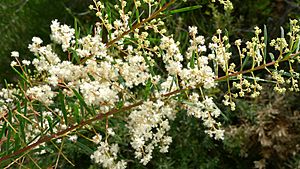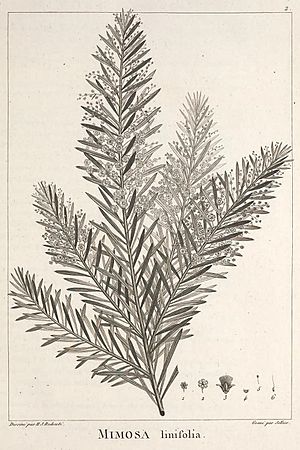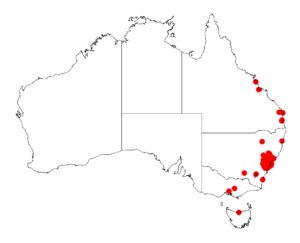Acacia linifolia facts for kids
Quick facts for kids Acacia linifolia |
|
|---|---|
 |
|
 |
|
| (Artist:Redouté) | |
| Scientific classification |
|
| Kingdom: | Plantae |
| Clade: | Tracheophytes |
| Clade: | Angiosperms |
| Clade: | Eudicots |
| Clade: | Rosids |
| Order: | Fabales |
| Family: | Fabaceae |
| Clade: | Mimosoideae |
| Genus: | Acacia |
| Species: |
A. linifolia
|
| Binomial name | |
| Acacia linifolia (Vent.) Willd.
|
|
 |
|
| Occurrence data from AVH | |
| Script error: The function "autoWithCaption" does not exist. | |
Script error: No such module "Check for conflicting parameters".
The white wattle (scientific name: Acacia linifolia), also called the flax wattle, is a type of wattle tree or shrub. It grows naturally in eastern Australia.
Contents
Discover the White Wattle's Look
This shrub usually grows to be about 1.5 to 4 meters (5 to 13 feet) tall. It can stand up straight or spread out. Its bark is often grey and smooth, or it might have small cracks.
Leaves and Branches
The branches of the white wattle are often smooth, but sometimes they can be a bit hairy. They have small ridges and point upwards at the ends. Like most wattle plants, it has special leaf-like parts called phyllodes instead of true leaves. These phyllodes are smooth and stay green all year. They are usually long and thin, measuring about 2 to 5 centimeters (0.8 to 2 inches) long and 0.7 to 2.5 millimeters (0.03 to 0.1 inches) wide. Each phyllode has a clear vein down the middle.
Flowers and Seed Pods
The flowers grow in groups of 5 to 17. They form round flower-heads that are about 4 to 5.5 millimeters (0.16 to 0.22 inches) wide. Each flower-head has 6 to 12 pale yellow to white flowers.
After the flowers bloom, thin, leathery seed pods grow. These pods are often covered in a fine white powder. They can be straight or curved and are mostly flat, but they bulge a bit where the seeds are inside. The pods are 3 to 12 centimeters (1.2 to 4.7 inches) long and 8 to 15 millimeters (0.3 to 0.6 inches) wide. The seeds are arranged lengthwise inside the pods.
How the White Wattle Got Its Name
The Acacia linifolia was first described in 1800 by a scientist named Étienne Pierre Ventenat. He called it Mimosa linifolia at that time. Later, in 1806, another scientist, Carl Ludwig Willdenow, changed its name to Acacia linifolia, placing it in the Acacia group.
The second part of its scientific name, linifolia, means "flax-leaved." This is because its phyllodes look a lot like the leaves of flax plants. This wattle looks quite similar to two other wattle species: Acacia boormanii and Acacia meiantha.
Where the White Wattle Grows
You can find the white wattle in New South Wales, a state in Australia. Its natural home stretches from the Hunter Valley in the north down to the Hill Top area. It is very common around Sydney.
This plant usually grows in dry sclerophyll forests (forests with tough, hard leaves) or in open woodlands. It prefers sandy soils over sandstone or clay soils over shale.
 | Valerie Thomas |
 | Frederick McKinley Jones |
 | George Edward Alcorn Jr. |
 | Thomas Mensah |

